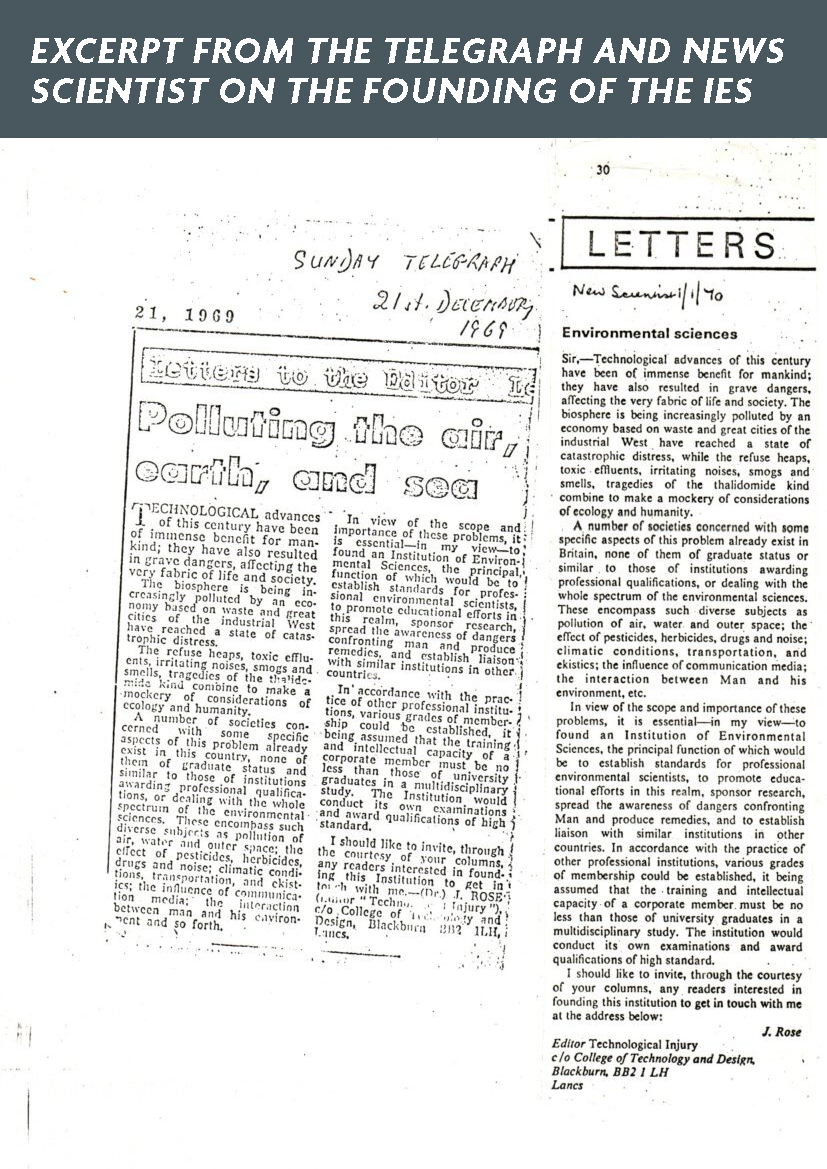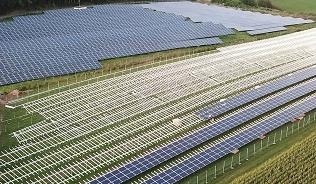In 1971, Dr John Rose began talks with several academics, industry professionals, and colleagues about the possibility of starting an organisation for environmental scientists. One year later, on January 18th 1972, our Inaugural Conversazione was held at the House of Lords and the IES came into being.
 1970 to 1980
1970 to 1980
The 1970s were truly an interesting era of public consciousness around climate action and the field of environmental science. Academics were beginning to realise there was a considerable need to create a unifying voice in response to the issues around environmental degradation. The IES was founded on this desire to bring early pioneers in the field together to create and influence real change in the sector.
1972 also marked the founding of the United Nations Environment Programme (UNEP) as an outcome of the Stockholm Conference on the Human Environment, bringing together countries around the world behind the push to address environmental issues.
1980 to 1990
The conversation around climate change and environmental issues expanded even further in the 1980s, with environmental disasters like Chernobyl and acid rain raising the profile of the topic amongst the public. 1983 brought the creation of the Word Commission on Environment and Development (Brundtland Commission), which produced the landmark report Our Common Future in 1987.
With the help of creative visualisations of climate change, such as Lovelock and Watson’s Daisyworld, the issue of climate change became a household concern.
The Intergovernmental Panel on Climate Change (IPCC) came into being in 1988, as a result of the Montreal Protocol a year earlier. Again, the world continued to shift its priorities to tackling climate change and environmental degradation. To match the tone of globalisation, the IES began holding international meetings and welcoming members from around the world – creating a space for academic and professionals across the globe to come together.
1990 to 2000
Moving to the 1990s, the UN Earth Summit in 1992 brought 172 governments from across the world together to address issues of emissions and scarcity. The United Nations Framework Convention on Climate Change (UNFCCC) was born from the Summit which, along with the Kyoto Protocol in 1977, guided the IES to issue an unprecedented number of responses to government consultations.
The 90s also marked the beginning of the IES’s flagship event series, the Burntwood Lecture, which aims to honour Lord Burntwood, one of the organisation’s founding members. The lecture series aims to give voice to current, critical, and often controversial environmental themes and ideas. It has featured notable speakers such as Lord Crickhowell, John Gummer MP, Sara Parkin, Bob Watson, and Jonathon Porritt, and continues annually to this day.
2000 to present
The 2000s saw even greater change to the industry, with the climate change movement becoming nearly mainstream in UK society. 2008 brought forth the Climate Change Act, passed by the UK Government – the first country in the world to have a legally binding set of carbon reduction targets.
In the 2000s, the work of the IES became ever more important, with the UK leading the world in climate change action and the organisation shifting the environmental SCIENTIST to focus on more wide-ranging themes and issues. The organisation also established new designations for professionals in the industry and began to focus on supporting recent graduates and current students.
2002 was an important year for the IES, in which both the Society for the Environment (SocEnv) – in which the IES played a major role in founding – and the IAQM were officially launched. Both organisations continue to have a major impact on the industry and help to offer new avenues for environmental scientists to expand their knowledge and contribution to society.
Today, we stand very proud of our history, in being early change-makers in the industry and providing a space for our members and communities to make real impact in the scientific network. We continue to push ourselves to be vocal spokespeople for science-led policy and hope our community can find a space with us to develop their understanding and skills through workshops, events, and publications.
If you’re interested in becoming a member of the IES, sign up for our mailing list here and learn more about how you can get involved with the organisation.
Do you remember the industry in 1972? What do you think has been the most impactful change or moment in history? Join the conversation on Twitter by using #IES50 #50YearsOfEnvironmentalScience.





